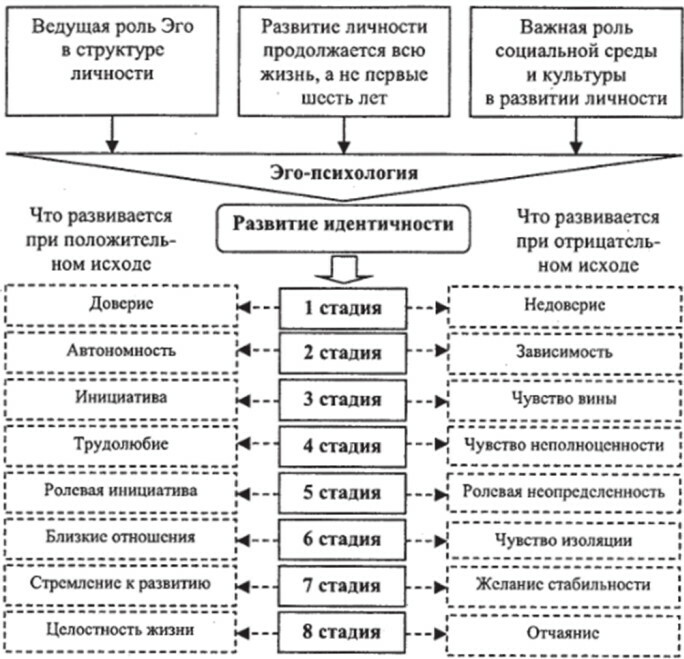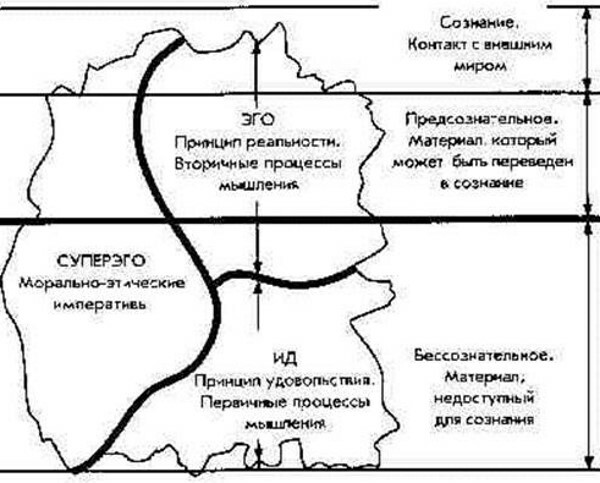Content
- Definition
- Classification
- Alter ego
- Super Ego
- Male and female Ego
- Functions and role
- Negative influences
- Forms of manifestations
- Psychological theories and schools
- Video about the ego in psychology
Today in psychology it is quite common there is such a thing as ego. This is a rather difficult term to understand, which is often confused with selfishness and other personality traits. The first to study the ego was the famous psychoanalyst Sigmund Freud. Further, the theory was continued by Carl Jung and other specialists who made an enormous contribution to the development of psychoanalysis.
Definition
The ego is a concept in psychology that represents one of three psychological entities (on a par with the It or the Super-I). This concept was first proposed by Sigmund Freud when he described the dynamics of the development of the human psyche. According to Freud, the ego is necessary for the implementation of executive functions and is a kind of mediator between the inner and outer world of a person.
Thanks to this, a person develops a continuous but consistent behavior. At the same time, a personal reference point is realized, starting with those events that have been preserved in memory. They correlate with existing data and those events that occur in the present or possibly will occur in the future. The ego does not belong to either the psyche or the body. Although certain bodily sensations can manifest themselves in the process of personality formation.
Also, according to the theories of Freud, in the process of development of absolutely any individual, the differentiation of the ego begins to take place and at the same time the super-ego develops. This means that a person develops certain inhibitions, and also improves the function of controlling instinctive impulses.
As a rule, this happens at the moment when a person begins to understand and evaluate parental as well as social standards. In the course of this, certain moral conflicts arise that are necessary for a person to grow up.
However, even when a person reaches his physical maturity, each individual is different from the other, which is explained by the development and effectiveness of the ego. Freud called this concept "Ego Power". If a person has a strong Ego, then he is more objective, better evaluates the world around him, as well as himself.
Such people plan their lives better, make decisions, never hesitate and choose the best option from alternatives. If a person has a poorly developed ego, then he is more like a child in his behavior, that is, he perceives the world around him in an overly distorted manner, which is why he is not able to achieve great success. In addition, neurotic syndromes are often diagnosed in people with a weak ego.
Ego was also considered by Carl Jung. He described this concept as a complex that contains all human consciousness related to the psyche, including the unconscious and collective unconscious. In his opinion, the Ego is awareness of your body, existence, memory. He viewed the ego as a complex of mental factors and described this complex as something that has a very high energy of attraction, which is able to pull the contents out of the unconscious the individual.
Later, Jacques Lacan was involved in the consideration of this term. He described the ego as an imaginary substance that begins to form as it progresses through the so-called mirror stage. In his theory of psychoanalysis, the ego is the opposition of the self. At the same time, the specialist emphasized that the Ego is an imaginary part of the psyche, which is given to a person as a standard analyzer capable of appealing with some knowledge.
Also, many other scientists were engaged in the consideration of this concept. For example, some saw the ego as the connecting center of the person's personality and environment. Accordingly, in the process of development of the individual, the ego begins to stand out much more and to a greater extent embraces the surrounding world, and also influences the personality.
Classification
The ego is a concept in psychology that has several varieties.
Alter ego
It is customary to call a state when a person is not able to correctly reflect his presence in the world around him, that is, he forms in his mind a certain personality or even a character that he could see in a film or read in a book.
This fictional character has those characterological traits that he would like to see in himself (but, in fact, they are absent). This image can be intentionally created, for example, when a person often performs in public and creates a certain image for himself. Also, Alter Egos were often met in royal dynasties, when the governors needed to seem more powerful, wise people.
Also, Alter Ego is part of the pathopsychological categories. We are talking about a situation when a person suffers from multiple personality and one of them begins to prevail, gradually covering the entire life of the individual. Alter Ego can also be referred to as False Ego, meaning it refers to a dissociative disorder or when a patient is diagnosed with a multiple personality disorder.
Such a state can be temporary in nature if the human consciousness, against the background of severe stress, is divided into several persons, one of whom helps him to experience a strong experience. At the same time, the Alter-Ego can manifest itself so much that the personality completely changes the temperament, taste preferences, sometimes even the timbre of speech and accent change.
Accordingly, the Alter Ego can be created independently by a person or become a mental disorder that needs treatment.
Super Ego
This is a relatively new concept of the psyche, which began to develop more simultaneously with society, as well as with its norms. The superego is influenced by common standards, values, rules. In simple terms, the Super-Ego is the Super Self. That is, a state when a person tries to organize several different personalities inside himself at once, each of which must meet certain rules of the environment.
As a rule, the Super I is formed most recently in the course of the growing up of the individual. The fact is that this part of the psyche appears only with active social interaction. A person develops certain moral and ethical concepts that completely change after the parent ceases to be the only person who can be right.
If there is correct maturation and the child was brought up in favorable conditions (he correctly perceives goodness and evil), then he will be able to transfer all this to his inner perspective and form his own inner parent.
The super-ego can manifest itself in different ways in human behavior. For example, in the first case, we are talking about the negative. This happens if the child is often punished for bad deeds. In this case, his conscience and shame develop too strongly, which begin to regulate all his social feelings. However, young children, like animals, usually do not have such experiences, because they are guided exclusively by their goals and ways of achieving them.
The second variant of the Super-Ego manifestation is excessive idealization, which is formed if the parents, on the contrary, encourage the child a lot. In this case, they put a model in the head of children that must be adhered to in order to be considered kind and even ideal people.
If the child is constantly praised for following the instructions of the parents, then a clear a bundle in which love, as well as a positive attitude, can only be obtained if it is perfect. Thus, we can say that the excellent student's syndrome or the constant need to please everyone is a manifestation of the Super-Ego.
Male and female Ego
The ego is considered in psychology also from the perspective of the feminine and masculine. This means that initially the Ego has a dual nature, and accordingly each person has both good and bad at once, that is, those balances that are necessary for the full formation of personality. If one of these parts prevails, then the second may disappear altogether. Also, in every person there is masculine and feminine, regardless of what gender the individual belongs to.
The gender division of the ego can be called a different perception of the world. It can differ depending on the hormonal as well as biological functions in the human body. Accordingly, instincts work differently in women and men and patterns of behavioral reactions are formed.
The Female Ego is characterized by how much a person is able to be compliant, to navigate in the environment, to take care of loved ones. Also, depending on the development of this trait, aggressiveness and excessive directness may appear.
As a rule, the female Ego is more responsible for controlling what is happening, as well as her life. If in a person the male Ego manifests itself too strongly, then the female, on the contrary, practically disappears. In this case, the person can show boasting and the need for recognition.
The male ego forces a person to try to achieve leadership positions, and this does not have to be about work. The same can be said about family life, when it is extremely important for a man that he is the head of the house. If the female Ego prevails in him, then, on the contrary, he will be more compliant and will always try to find the optimal solution to problems.
Finding a harmonious combination of male and female Ego is extremely difficult and such examples are extremely rare. This is primarily due to the fact that a woman does not want to recognize her masculine part in the same way as a man completely rejects the femininity of his self-representation. This makes it more difficult to build a happy relationship and achieve the kind of success that could be obtained if the individual recognized both sides of his personality.
As a rule, the formation of the male and female Ego occurs before the age of 3. Most often, this is greatly influenced by the parental behavior model. Accordingly, we can conclude that the male and female Ego largely depends on which country the person lives, what social norms are adhered to in his environment, what is considered immoral and other.
Functions and role
The ego is in psychology that part of the personality, the main function of which is to protect the individual from a state of discomfort.
The protective function of such a plan is activated under some factors:
- If a person is trying to get away from their beliefs, as well as habits. This can happen when a child was brought up in one environment, but then realizes that the world around him provides him with more opportunities and he can make decisions on his own.
- If there is a conscious desire to learn something new. A person experiences helplessness when he realizes that he does not know something, but at the same time he has a thirst to learn more new information.
- If he tries to listen to his inner self and understand his real goals and needs. In this regard, we can also say that initially the child was brought up in one tradition, but deep inside himself he understood that he wanted a different life.
- When there is a desire to stand out from the crowd. In this case, individuals often begin to ignore generally accepted rules of behavior. A person can choose clothes that are flashy or completely inappropriate for a particular situation.
That is, the Ego allows you to correlate reality with a person's own thoughts, his desires. It is a binder that allows you to develop other mental structures, especially will and aspiration. Also, the Ego performs the function of self-determination, that is, it allows the individual to compose a full-fledged image of his own state. In addition, self-determination is necessary to form a psychological image, character habits, goals.
The function of socialization, which is also performed by the Ego, is necessary at a time when the individual is just trying to find his place in life, as well as in society. Thanks to the Ego, he develops leadership qualities, the ability to work in a team, or, conversely, independently perform numerous tasks. The more social interaction in life, the more a person manifests a need to use methods of psychological defense, and therefore, the more the ego grows.
Thanks to this state, you can get away from psychological trauma, stress and form a harmonious, stable and happy life. The ego allows you to create an ideal image that is not necessarily static and can change over the course of a person's life against the background of the information and experience that he receives.
In simple terms, the ego of a person is his aspirations, desires and thoughts about who he really wants to be. If he never thinks about it at all, then this indicates a very weak development of the Ego.
Accordingly, it is impossible to underestimate the importance of the development of this part of the human psyche, since without it it is impossible to realize oneself as a person. On the one hand, we can say that this is a person's self-esteem, when he does not consider himself worse than other people and understands that he is able to achieve more. But nevertheless, these are different concepts.
If the ego is developed very strongly, then this allows not only to convince oneself of its supervalue, but also of the unimportance of everyone around. That is, it may be a distorted opinion that forces you to fit yourself into a fictional image.
At the expense of the ego, the aggression of other people, psychological pressure is more easily transferred. If a woman is afraid to leave her husband, who suppresses her psychologically throughout the entire joint life, this also indicates a very weak development of the Ego, and not about some other mental problems. Thanks to this factor in the formation of personality, a person learns to weed out all the bad in his life and focus more on the good.
Even if an individual does not want to listen to criticism in his address, this indicates that his protective function is activated, that is, it does not allow him to experience discomfort. Sometimes this function is rather primitive. That is, when a person begins to behave capriciously and simply leaves some topics. But it all depends on the individual situation and on how the person was brought up and what kind of life experience she has.
Negative influences
In addition to the positive aspects, the ego also has disadvantages. Since we are still talking about a rather distorted self-conceit (albeit for the better), sometimes this part of the personality can develop too much. For example, if a person is not able to objectively look at himself and his actions, then he will not be able to start making adequate decisions.
In this case, he actually begins to fixate on his Ego. Exaggerating your capabilities can lead to serious consequences. That is, in fact, we are talking about too strong self-deception, which can destroy the whole life.
Many writers and specialists view the ego exclusively from the negative side, as an internal an enemy with whom a person fights throughout his life and he can win only if he overcomes his ego. It seems that only in this situation can one obtain the necessary life wisdom. However, this is fundamentally wrong, since the ego cannot be associated with pride, narcissism, vanity and other vices characteristic of a person. Although sometimes these concepts are too close to each other.

If the Ego leads to selfishness, then the person becomes insatiable, demands too much from others and does not believe that he should do something in return. This happens only in those situations when a person is not able to realize also his inner self. An individual can be selfish and obstinate in his desires or even whims. This happens if he does not understand at all the difference between self-conceit, objectivity and real life.
Such cases are extremely rare. In such situations, a person completely concentrates only on his opinion, so that in no case does he get into psychological discomfort. That is, the problem lies in elementary ignorance and misunderstanding of oneself.
This negative side of the ego is most often encountered by illiterate young people who have not yet learned how to navigate in society. If the Ego turns from dreams and goals into an illusion that a person imposes on himself, then this leads to the fact that he begins to close his eyes to his mistakes, without making absolutely any conclusions.
Forms of manifestations
The ego is a rather complex but important concept in psychology. There are several forms of manifestation of this part of the personality, which make it possible to determine how much the Ego influences a person.
| The form of manifestation of the ego | Description |
| Man always knows everything himself | It is extremely difficult for an individual to admit that he does not know something. He tries to voice the answers to any questions, even if they are completely illogical and incorrect. A person refuses to listen to someone else's opinion, does not follow the advice of relatives and friends. |
| There is a desire to prove what you are worth | Excessive manifestation of the Ego is observed in the event that a person begins to reach fanaticism in the desire to win in various competitions and competitions. However, if we are talking about a child whose room is filled with certificates, cups and medals, then perhaps we are not talking about his Ego, but about an attempt at self-realization through the child of his parents. |
| A person achieves something, but stops moving on | When a person does some significant act in life and after that he lives only by memories and constant stories about him. |
Psychological theories and schools
There is a separate area in psychoanalysis called ego psychology. It examines the adaptation of the individual to the world around him, and also deals with issues of freedom, autonomy and other personality traits. The theory is based on the theories of Freud, Hartmann, Spitz and other psychoanalysts.
Initially, the ideas of ego psychology were developed on the basis of child psychoanalysis. Also, at first, experts considered 2 main areas of this category of psychology. First of all, according to Freud, when the Ego performs an important protective function. In the second case, preference was given to the theories of Hartmann, who paid more attention to the secondary aspects of the self - rational thinking, action, and so on.
Also, the Ego is considered in many world religions.
For example:
- In Hinduism, it represents a distorted ability to perceive the world. But the ego is not considered evil. It can only be understood correctly or incorrectly.
- In Christianity, the ego is the main answer to the question of who a person is.
- In Kabbalah, this concept is considered as egoism, from which a person must get rid of. It is believed that only in this way a person will be able to understand the divine, and will not concentrate on his desires.
- In Buddhism, the closest concept is "ahamkara". This is one of the most important objects of study. The ego is believed to be the source of understanding the world.
Thus, the Ego in psychology is one of the key concepts that helps to conduct a more detailed psychoanalysis. To understand the meaning of this component of the personality, it is necessary to be able to distinguish it from egoism, self-conceit and other concepts that are close in meaning. But, in general, the ego is not harmful if it is formed correctly. Then the person can become more successful and achieve their goals.
Video about the ego in psychology
The ego needs to be destroyed:



